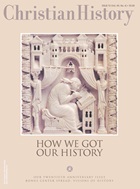Kenneth Scott Latourette was the first, and until recent years, almost the only major historian to write the history of Christianity in a way that dealt seriously with its presence in all six continents. He is now mainly remembered as a historian of missions. In his view, though, it was mission that determined the nature and meaning of Christian History.
Latourette was born in Oregon City, Oregon, in 1884. He majored in science at his local college, then went on to Yale, where he studied history. He wrote his doctoral dissertation on American relations with China—an unusual topic for the period.
The Student Volunteer Movement for Foreign Missions was then in full flow, and Latourette became an enthusiastic volunteer. He served as a traveling secretary for the movement for a year, visiting colleges and universities to promote the cause of missions, before, in 1910, being appointed as a missionary himself.
Latourette joined Yale's mission in China, which intended to combine Christian teaching with excellence in higher education. But Latourette's service was brief and frustrating, as illness forced him to return home in 1912.
On his recovery, he taught history, first at Reed College, and later at Denison University. He was also ordained as a Baptist minister. Then, in 1921, Yale claimed him again as professor of missions in the Divinity School. He kept that post, as well as a dual appointment in the history department, until his retirement in 1957. He died in his native city, following a road accident, in 1968.
Latourette redirected Christian scholarship by presenting missions as the history of Christianity itself, not as an appendix to "church" history. He also made breakthroughs in the field of Asian history, a topic few American universities addressed in his day. His work in this "secular" field helped him to correct the Eurocentric bias common among church historians.
Mission marches on
Latourette's best works are his multi-volume global studies: A History of the Expansion of Christianity, Christianity in a Revolutionary Age, and A History of Christianity. At the time of their publication, these works represented the most comprehensive attempt to cover Christian History in all parts of the world and in all its traditions.
The History of the Expansion of Christianity, Latourette's great monument, charts the periods of Christian advance and recession up to the end of World War II. The first volume examines the early spread of Christianity outside, as well as inside, the Roman Empire. The second, titled "The Thousand Years of Uncertainty," argues that the fate of Christianity hung in the balance for a millennium, as eclipse in Asia and the earliest centers of Christian strength paralleled advance among the barbarian peoples of Europe.
A third volume focuses on the period 1500-1800, which he sees as "Three centuries of advance," though with intervals of hesitation and retreat. He then devotes three volumes to what he calls "the Great Century," the nineteenth, looking at each continent in turn. The final volume, after surveying the first half of the twentieth century, discusses the Christian story as a whole.
For Latourette, Christian History is not about institutions; it is the story of the spread of the influence of Christ on earth. In the course of that story, people who have taken or been given titles such as Marcionite or Montanist, Nicene or Arian, Nestorian or Chalcedonian, Catholic or Protestant or Orthodox have all been part of a Christian movement. Waiving questions of orthodoxy, Latourette asks each group how far it advanced the influence of Christ.
Latourette has been accused of superficiality in his concept of expansion, of theological naiveté, and of an essentially secular optimism. Still, his analysis of Christian expansion has some depth.
He sees Christian expansion in three dimensions. In addition to the statistical and geographical dimension, he is concerned with the number and quality of movements of renewal, and with the influence of Christ on individuals and civilizations. His optimism derives from his faith in God's providence and Christ's ultimacy, and he freely points out that Christian History is marked by recession as well as advance.
The principal defect of his work for today's readers is not his fault. He wrote before much research became available on Christianity in the non-Western world. Therefore, Latourette's "Great Century" centers on the efforts of Western missionaries, rather than on movements among Africans and Asians and Latin Americans and Pacific Islanders. But if any historian prepared readers for the situation of the early twenty-first century, in which non-Westerners constitute the majority of Christians, it was Kenneth Scott Latourette.
Andrew F. Walls, a scholar at the University of Aberdeen and the University of Edinburgh, is author of A History of the Expansion of Christianity Reconsidered.
Copyright © 2001 by the author or Christianity Today/Christian History magazine.
Click here for reprint information on Christian History.

Support Our Work
Subscribe to CT for less than $4.25/month




























